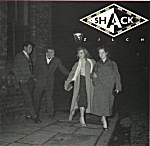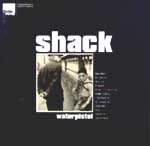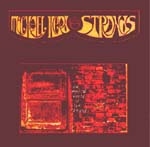 | Do you remember how you first came across a great group, a certain songwriter, an infectious collection of rhythms? I do, usually, though my memory doesn't stretch, as one Pop Trivia King's does, to being able to name exactly which shop he bought any particularly record in. Sometimes I read between the hyped or prejudiced lines of a review and think I see something I like the sound of, sometimes Peelie or Peterson will play something that metaphorically makes me pull over to the side of the road with tears in my eyes, as the former literally did when he first heard 'Teenage Kicks'. But more often it's been friends consigning a tape to the post, shrewd guessers of my taste and passionate about their own, and you'll have read about the kind of thing they've pushed my way on the pages of this website. They keep their ears and noses to the ground, and I'm very grateful. I first heard the Pale Fountains on a tape a school friend did for me. Tibor Pinteer put 'Pacific Street' on one side, and Prefab Sprout's 'Swoon' on the other. Songs Written Out Of Necessity soon became songs listened to out of necessity. I used to sit next to Tibor in maths; he was of Hungarian origin, and his family ran a restaurant in town called the Silken Tassel. I don't know what became of him. There were some rumours of hard drugs and Norwich, but only rumours. Paddy McAloon, he's apparently working on some epic 'story of earth' concept, occasionally filing a sugary album to keep his record company happy. And the Pale Fountains' Michael Head, who from the moment 'Reach' launched itself from the speakers showed himself to be another gifted Liverpudlian with a bagful of self-belief? Let me tell you a little of what became of him. Liverpool has had so many underrated heroes in among the McCartneys, McCullochs and McManamans we all know about. You couldn't be more unsung than the McHellfire Sermons, more defiant of the industry than the La's Lee McMavers, or more flirtatiously subversive than Bill McDrummond. But Michael and John Head have never really had their due, despite creating some of the most stirring and intimate pop music of the '80s and '90s. Until now, it seems, with the new Shack single, 'Comedy', having received the Radio 1 play list treatment (two months before it was actually released), and journalists who've been looking the other way for ten years busy helping London Records' marketing department do its job. 'The greatest band you never heard.' Ha. And whose fault is that? |
 | The Pale Fountains released two LPs. The ambitious if uneven 'Pacific Street' blazed with guitars and brass, softening occasionally into folksy acoustics and sweeping strings, while Mick's wordy couplets were sung in a pure, fragile and proud Liverpudlian. '... from across the kitchen table' was packed with more hit singles than a cricket scorecard. In theory, at least. Songs like 'Jean's not happening' were full of Merseyside swagger, and younger brother John's virtuoso Love-inspired lead guitar. Perhaps Mick's singing had become a little histrionic in his search for soulful expression, but it was an implausibly upbeat album full of memorable lines: 'in a cheap hotel room the miraculous way you bucked up when I said you were incredibly beautiful'; 'and when I met you in the subway station, you looked as though you hadn't seen the queen's face for a while'. But away from the studio, there wasn't much to be optimistic about. All the money Virgin had thrown at the group was being spent on a little, then a lot, of what you fancy, and the hype was failing to recoup that money in sales. Bassist Chris McCaffrey pulled his plug, and that was the end of the Paleys. |
In an interview with Emmanuel Tellier for the French music magazine Les Inrockuptibles in 1990, a point in time when British journalists were falling over themselves to resuscitate his talent on behalf of the nation, Michael Head had a chance to tell his story. 'I almost never went to school, I couldn't stand the rules. At school, everybody got on my wick. So I played footie or stayed at home with me mam. She liked the company. We sang together. Mam had a fantastic way with the old songs. She made me work on my voice. It was also her that encouraged us to form a band. So we'd have three or four guitars in the living room, and mam would make us tea. Then we'd trash our six strings. ... 'I didn't know how to conduct myself. Should I be very strict and preserve the purity of the songs, or should I profit from the possibilities offered by Virgin? Can you imagine what it was like for me to find myself at twenty in front of a thirty-piece orchestra? I wasn't a conductor. Even if it was all very exciting, I was definitely ill at ease.' The interview finished with Mick apologising to all their French friends for messing up, and Emmanuel told me that it was the best interview he'd ever done. | |
 | After the first of numerous periods out of the spotlight Michael Head had already been quite successful at dodging, the brothers returned as Shack, the name conjuring up the spirit of Love, whose 'A house is not a motel' the band had turned to covering in the last days of the Pale Fountains. 1988's 'Zilch' was an angry album, a document of the mid '80s in two senses: Michael Head's protest on behalf of his city against the havoc wreaked by Thatcher, and Ian Broudie's heavy-handed production, the clattering artifice of the drum sound ruining what could have been the best album of the decade. (Broudie also helped to take the edge from what should have been a classic Bodines record the previous year.) That it's still listenable is testament to its directness and dry humour. Scour the second-hand shops, and you may find a copy of the 12" of 'Emergency' from the same year. Its two band-produced B sides, 'Liberation' and 'Faith' give you an idea of how great 'Zilch' could have been. Each rattles along, 'Liberation' echoing the folksy chug of 'September Sting' on '... from across...' and hinting at 'Hocken's Hey' on the later Strands album, and 'Faith'* striding out defiantly, wearing its chiming guitars with pride. |
 | The next Head-turning moment was the baggy scally swagger of the 1990 'I Know You Well' single; yes, the Liverpudlians had embraced the sound of Madchester, albeit with a McCartneyesque bass line driving through its psychedelic rain of effects-laden guitar. It was an isolated moment though - years were to pass before an album called 'Waterpistol' crept unannounced into the shops. 'Waterpistol' has an uncanny parallel in 'The new folk sound of Terry Callier', the majestic Chicagoan's first LP, recorded one Saturday afternoon back in 1964. The producer was so moved by Callier's fusion of jazz, soul and folk that he skipped off to an Indian province in Mexico with the master tapes, there to sample the local mushrooms. The LP was finally released in 1968, with Terry only learning about it when his brother saw a copy in a second-hand bookshop. The studio containing the master tapes of 'Waterpistol' burnt down, and producer Chris Allison, who'd done a consistently good job, disappeared to the States with the DAT copy. On return he realised he'd left it in a hire car. The DAT was tracked down, but by this time Shack's record company had folded. Four years on from the date of recording, the honourable Marina came in to save 'Waterpistol' from the dust it was gathering. It was a small step in the long haul that seems finally to have saved Mick Head, as Terry Callier before him was saved by the enthusiasm of Gilles Peterson and Kevin Beadle, from an indifference as surprising as the talent of each is unique. |
 | A German label had come to the rescue of 'Waterpistol'; now it was the turn of French label Megaphone, who offered Mick a small sum to make an album for them. 'The magical world of the Strands' was the result, and it underpins this whole story, making it worth the telling. If 'Zilch' was Mick at his most socially concerned, then 'The magical world of the Strands' sees him in about as other-worldly a state as it's possible to record. The echoing, raining, hollow sonic quality is matched by songs that come from another age, and tender singing that is without a trace of vanity or self-reverence. That it's a record apparently made in the sub-aqueous depths of heroin is a fact that you shouldn't hold too near the front of your mind when you're listening to it. 'The magical world' is beyond the substances that sustained it. It's an instrumentally beautiful record, totally idiosyncratic, rightly titled magical - alluding to a fantasy world beyond reality, or of heightened reality. Songs such as 'Something like you' and 'Fontilan' are liquid, sleepy, and impressionistic. Others - 'Queen Matilda', 'Hocken's Hey - are folk songs in the truest sense, mythical and timeless; they give you a notion of the Head brothers hanging out with Robin Hood beneath the canopy of Sherwood Forest, or standing with their noses to the breeze off the Mersey long, long before there was a Liverpool to give birth to them. It sounded like the last we would hear of him, but it wasn't. April 1999 saw Shack take the stage of the Notre Dame Hall in London, a new set of songs under their arms. Michael Head was nervous before the circular dance floor's sea of faces. Adrenalin mixed with stuttering jokes as the first song ended and the second began. A short way into the set, there was a change. A look of total pleasure replaced the nerves, and the many years of obscurity, the rejected and wasted talent, the lost recordings, none of it counted any more. Playing vital songs to an audience so fully on his side, Michael Head was back where he belongs. © Daniel Williams, June 1999. * If any Pop Trivia Kings or Queens out there can tell me something about the original, apparently by Manicured Noise and written by one S. Walsh, I'd be grateful: daniel@tangents.co.uk Now read the Tangents reviews of the Shack LP HMS Fable. |